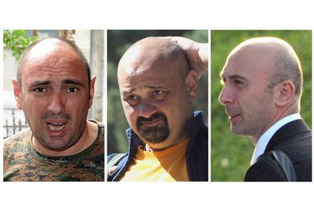Vladimir Socor, the Jamestown Foundation
Georgia’s official presidential photographer, another photographer who was an Internal Affairs Ministry contract employee, and the Tbilisi representative of the European Pressphoto Agency (EPA), have all pleaded guilty and received suspended sentences on espionage charges. The three were in pre-trial detention since July 7, suspected of photocopying and collecting state-classified documents for delivery to Russian military intelligence (GRU) contacts (see EDM, July 14).
On July 22, the three were released in the courtroom after a 45-minute trial, based on a plea-bargaining agreement signed that same day by the defendants, their respective lawyers, the prosecution and the court. Presidential photographer Irakli Gedenidze, the Interior Ministry’s former photographer on contract Giorgi Abdaladze, and EPA’s Tbilisi representative Zurab Kurtsikidze were sentenced to prison terms of three years, three years and two years, respectively. In the same move, the court suspended the imprisonment sentences and put the defendants on probation terms for three years, three years, and four years, respectively. They retain the right to exercise their profession in Georgia while on probation. Abdaladze’s wife received a six-month suspended sentence for minor complicity.
According to the Prosecutor’s Office, the defendants fully cooperated with the investigation and corroborated information about Russian intelligence activities against Georgia. The value of this information earned them mitigating circumstances. Under Georgia’s criminal code, the defendants were liable to prison terms of up to 12 years. Apparently, the plea-bargain and the court’s lenience are intended to encourage agents or collaborators of Russian intelligence in Georgia to seek similar arrangements with the authorities.
The trial had to be held in camera because the evidence consisted of classified documents photocopied by the defendants. Some documents were too sensitive to be submitted in evidence for the trial. Documents that were submitted to the court included a floor layout of President Mikheil Saakashvili’s residence, lists of cleaning personnel of the presidential buildings and of the State Procurement Agency (provider of services to the presidential administration), a schedule of the president’s appointments and itineraries of his visits in the country, a schedule of coordinated actions by the state guards’ service and the Internal Affairs Ministry, a plan of security measures for Estonian President Toomas Ilves’s recent visit to Georgia, transcripts of Azerbaijani Foreign Affairs Minister Elmar Mammadyarov’s recent top-level meetings in Tbilisi, as well as lists of Georgian citizens employed by the United Nations, OSCE and the Council of Europe.
These were photocopied official documents, found in the defendants’ homes and computers during the investigation by the Internal Affairs Ministry’s counterintelligence division. The prosecution also submitted a list of phone calls between Kurtsikidze and two purported GRU officers. Within hours of the trial on July 22, Georgia’s Justice Ministry posted the evidence on its website (www.justice.gov.ge, Civil Georgia, Netgazeti, www.presa.ge, July 22).
Documents containing these types of information could clearly be used by the intelligence services “of a neighboring country” (as Georgian authorities phrased it) for hostile penetration of Georgian presidential buildings, recruiting agents and informants, circumventing security arrangements, and potentially orchestrating some “special operation” to physically remove the Georgian president and his team. The Kremlin has more than once publicly alluded to such an operation against President Saakashvili. His predecessor, Eduard Shevardnadze, had been the target of two assassination attempts organized in Russia and openly welcomed by Moscow’s official establishment at that time. Thus, the Georgian government cannot be too cautious about documents, such as the photocopies found in the photographers’ possession, being delivered to Russian intelligence contacts.
Gedenidze, the presidential photographer, made an early confession on July 9. Abdaladze, the Interior Ministry’s former contract photographer, pleaded not guilty and declared a hunger strike initially, but recanted and confessed on July 18. Their lawyers were present during those confessions. The authorities aired the videotapes on television posted them on the internet on the same day in each case, and also distributed the videotapes to journalists on CDRoms (Rustavi 2 TV, Imedi TV, Civil Georgia, July 9, 10, 18, 19, 22). The confessions were intended for public information, but did not form a basis for the criminal charges. Only the documents found in the defendants’ possession during the investigation were submitted in evidence to the court.
A militant element among Georgian opposition journalists portrayed this investigation as a move to intimidate journalists and restrict media freedom. This reasoning reflected five misconceptions. First, the investigation was unrelated to any journalistic or political activity of the defendants, but only concerned their illegal handling of state-classified documents. Second, Gedenidze and Abdaladze had the status of employees of state institutions, not journalists, at the time of their wrongdoings (while Kurtsikidze worked for a foreign employer, EPA). Third, the trial could not be open to the media and the public – as the militant opposition journalists insisted – because it involved classified documents (some of which could not be submitted even in camera) and the risk of openly provoking Russia. Fourth, these critics completely overlooked the security implications of a possible Russian penetration of the presidential buildings. And fifth, the demand for full declassification of the evidence and an “independent” investigation by the media would have turned due process of law into a populist exercise.
Rather than reporting the case, the opposition press insisted that media freedom and indeed photography itself was being suppressed in Georgia. By way of argument, opposition newspapers appeared with blank spaces inscribed with protests, in the spaces reserved for photographs. That logic recalled the 2009 protests during which opposition groups built imitation prison cells as a protest action, in the absence of any political prisoners in Georgia. The claim that Georgian media freedom and photography are being suppressed, similarly belongs in a realm of fantasy.
Original text




